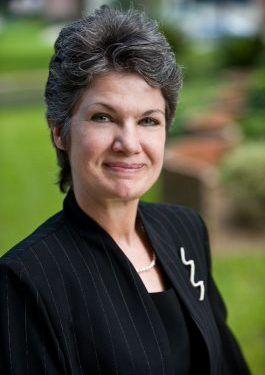Nursing Prof To Give National Lecture On Patient Care
July 30, 2012
SHSU Media Contact: Jennifer Gauntt
 Mary Anne Vincent, assistant professor of nursing, will be sharing her research on intensive-care unit care with a national audience during the Council for the Advancement of Nursing Science’s 2012 State of the Science Congress on Nursing Research conference in Washington, D.C., Sept. 13-15.
Mary Anne Vincent, assistant professor of nursing, will be sharing her research on intensive-care unit care with a national audience during the Council for the Advancement of Nursing Science’s 2012 State of the Science Congress on Nursing Research conference in Washington, D.C., Sept. 13-15.
Vincent will present her work on “ICU Patient Core Body and Ambient Temperature 24-Hr Patterns and Illness Severity,” which examines patients in intensive care who were mechanically ventilated for up to seven days.
“Essentially, if you let patients rest, especially at night, they will get better faster,” she said. “When I was a nightshift bedside RN in the intensive care unit, I found anecdotally that patients got better when my work for the shift was better organized, such that I reduced the number of interruptions to their sleep.
“It was also noticed by physicians. I had them requesting to have me care for their patients because they would often get them off the breathing machine a day or two earlier than expected,” she said. “It just seemed like common sense to me, and I did not realize that what I did was very unique.”
The work became part of her doctoral dissertation, which was completed in May 2011 at The University of Texas Health Science Center at Houston School of Nursing, in which she concluded that “environmental thermoregulation may have a more vital role in nursing therapeutics than we realize.
“Because body temperature is a biomarker of the central circadian clock which regulates global physiologic and metabolic processes, additional research is needed to clarify the relationship between the body temperature and room temperature profiles of ICU patients on breathing machines,” Vincent said.
This work is significant because never before had body and room temperature measures been compared in the way Vincent compared them.
“Usually, the investigator either writes down the measures from the patient's chart or they simply have the nurse write down what the patient's temperature was each hour,” she said. “I built a computer interface to an ICU monitor, and recorded these measures in real time, with detailed time stamps.
“The clock was precise with the clock the hospital used for timing. Thin wire rectal thermistors are routinely used in the ICU,” she said. “I used my own thermistors and verified their calibration before recording the data. This part especially has never been done.”
Her presentation with the CANS conference will not only allow her to share her groundbreaking research but will also place SHSU’s new nursing program in the mix with other more well-established and –developed programs, adding to the reputation of SHSU, she said.
“The Council for the Advancement of Nursing Science 2012 (conference) is a very prestigious nursing conference. It is a highly competitive conference in which to have your work accepted - especially for a symposium/podium presentation. CANS is a conference of the American Academy of Nursing - which is the American organization of the highest level of nursing science.
The conference is held every two years in Washington, D.C., and this will mark Vincent’s third acceptance to the conference. She previously presented a poster in 2006 and a symposium lecture on biochemical marker assay development and validation in 2008.
- END -
This page maintained by SHSU's Communications Office
Associate Director: Julia May
Manager: Jennifer Gauntt
Located in the 115 Administration Building
Telephone: 936.294.1836; Fax: 936.294.1834
Please send comments, corrections, news tips to Today@Sam.edu.

 SamWeb
SamWeb My Sam
My Sam E-mail
E-mail

